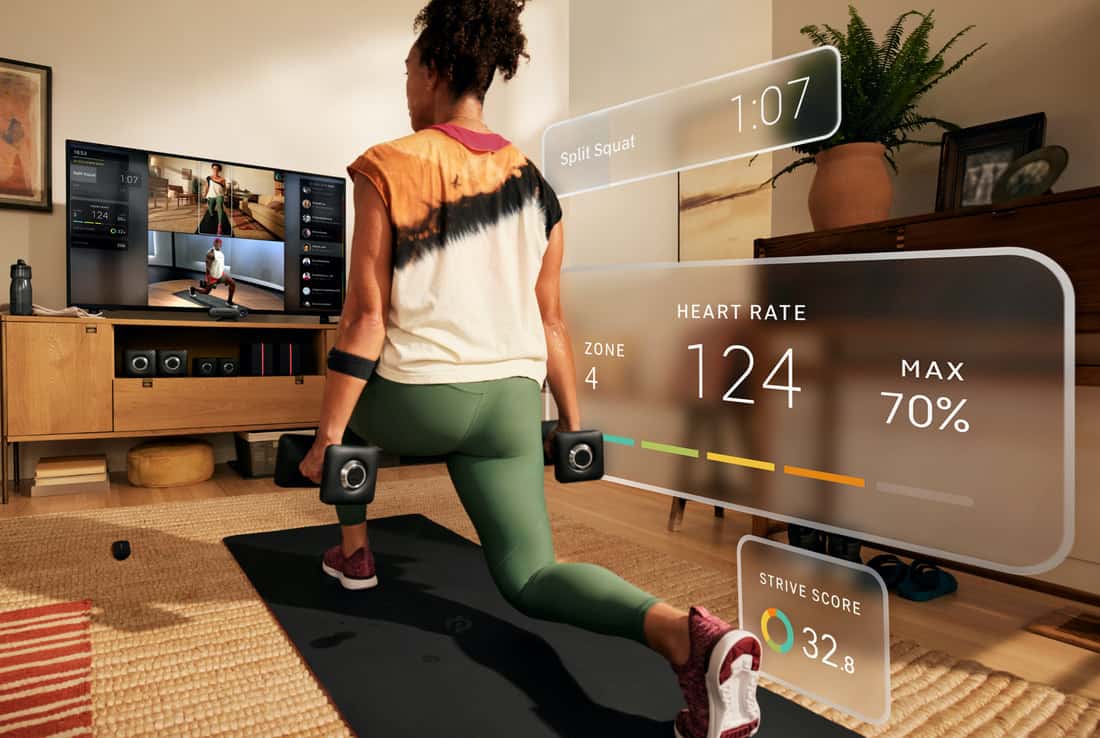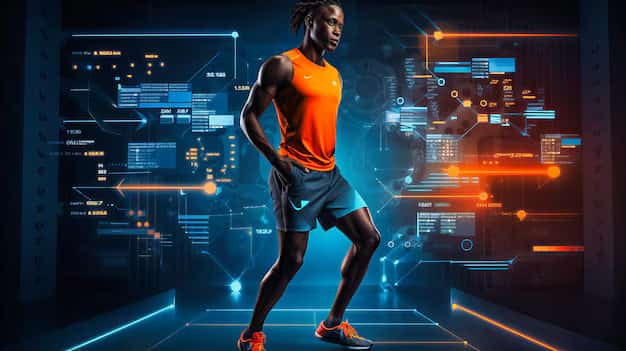Introduction to AI in Fitness and Bodybuilding
Artificial intelligence (AI) is revolutionizing various industries, and the fitness and bodybuilding sector is no exception. By leveraging AI-driven tools and applications, traditional fitness regimes are being transformed to offer unprecedented levels of personalization, efficiency, and data-driven insights.
AI technology enables the creation of highly personalized fitness plans tailored to an individual’s unique needs and goals. These AI-powered systems analyze a multitude of variables, such as body composition, nutrition, workout history, and even sleep patterns, to design optimized training programs. This level of customization was previously unattainable and is now making fitness and bodybuilding more accessible and effective for everyone.

Efficiency is another significant advantage brought by AI in fitness and bodybuilding. AI algorithms can quickly process vast amounts of data to provide real-time feedback and adjustments to workout plans. This immediacy ensures that individuals can make the most out of their training sessions, avoiding inefficiencies and maximizing results. Moreover, AI can automate various aspects of fitness routines, such as tracking progress and scheduling workouts, freeing up more time for individuals to focus on their actual training.
Data-driven insights offered by AI are invaluable for those serious about their fitness and bodybuilding goals. AI systems can collect and analyze data from wearables, fitness apps, and other sources to provide deep insights into performance metrics. These insights help in understanding what works and what doesn’t, enabling individuals to make informed decisions about their fitness strategies. Additionally, AI tools can predict potential injuries and provide recommendations to mitigate risks, ensuring a safer training environment.
In essence, the integration of AI into fitness and bodybuilding is paving the way for a smarter, more efficient, and personalized approach to achieving fitness goals. As AI technology continues to advance, its impact on the fitness industry is set to grow, offering new possibilities for enhancing physical health and performance.
Personalized Workout Plans
Artificial intelligence (AI) technology has revolutionized the fitness and bodybuilding industry, particularly in the realm of personalized workout plans. By leveraging AI algorithms, fitness apps and platforms can analyze a myriad of data points to create customized exercise routines that cater to an individual’s unique needs. These data points include fitness levels, body type, goals, and personal preferences, ensuring that each workout plan is both effective and engaging.

AI-powered fitness applications collect user data through initial assessments and ongoing tracking. For instance, an app may begin by evaluating a user’s current fitness level through a series of questions and physical tests. This initial data serves as a baseline, allowing the AI to tailor workouts that are challenging yet achievable. As users progress, the AI continuously monitors their performance and adapts the workout plans accordingly, making adjustments to intensity, duration, and type of exercises to maximize results.
Moreover, AI considers individual body types and personal goals. Whether one’s objective is to build muscle, lose weight, or enhance endurance, AI-driven platforms can design specialized routines that align with these goals. For example, a bodybuilder’s program might focus on hypertrophy with a mix of heavy lifting and low-rep sets, while someone aiming for weight loss could receive a plan emphasizing cardio and high-rep strength training exercises.
Several AI-powered fitness apps exemplify the capabilities of this technology. Apps like Freeletics and Fitbod utilize advanced algorithms to generate personalized workout plans. Freeletics uses AI to offer tailored HIIT (High-Intensity Interval Training) sessions based on user feedback and performance metrics. Fitbod, on the other hand, creates strength-training routines by analyzing previous workouts and muscle recovery data, ensuring balanced muscle development.
In conclusion, AI technology has made personalized workout plans more accessible and effective. By intelligently analyzing a variety of factors, AI-driven platforms offer tailored fitness solutions that not only cater to individual needs but also adapt over time, promoting continuous improvement and sustained motivation in one’s fitness journey.
AI-Driven Nutrition and Diet Planning
In the realm of fitness and bodybuilding, nutrition plays a pivotal role. Traditional diet plans often rely on generic guidelines, but with the advent of artificial intelligence (AI), there’s a transformative shift towards personalized nutrition and diet planning. AI can analyze an individual’s dietary habits, nutritional needs, and specific fitness goals to recommend tailored meal plans that align with their bodybuilding and fitness objectives.

AI algorithms investigate a user’s dietary patterns by collecting data through various means, such as food logs, wearable devices, and even social media activity related to food consumption. By understanding what, when, and how much an individual eats, AI systems can identify nutritional deficiencies, excesses, and overall dietary trends. This comprehensive analysis allows AI to craft diet plans that cater to the unique needs of each person, ensuring they receive the right balance of macronutrients and micronutrients essential for muscle growth and overall health.
Several apps and tools leverage AI to help users track calorie intake and maintain a balanced diet. Applications like MyFitnessPal and Lose It! use AI to scan barcodes, recognize foods in photos, and log meals, providing users with real-time feedback on their nutritional intake. These tools can also suggest healthy recipes that match dietary preferences and fitness goals, making it easier for bodybuilders to adhere to their nutrition plans.
Moreover, AI can dynamically adjust diet plans based on progress and changing goals. For instance, if a bodybuilder is preparing for a competition, AI can modify the nutritional intake to optimize muscle definition and performance. Conversely, during the off-season, AI can recommend a higher caloric intake to support muscle gain and recovery.
In essence, AI-driven nutrition and diet planning offer a highly personalized approach to fitness and bodybuilding, ensuring that each individual’s dietary needs are met with precision and flexibility. By harnessing AI technology, bodybuilders and fitness enthusiasts can achieve their goals more efficiently and sustainably.
Real-Time Performance Tracking and Feedback
Advancements in AI technology have revolutionized the way individuals approach fitness and bodybuilding. One of the most significant breakthroughs is the ability to monitor workout performance in real-time. Wearable devices and sensors play a pivotal role in this transformation, offering detailed insights into various aspects of an individual’s workout regimen.
Wearable devices equipped with AI capabilities can track an array of vital metrics, including heart rate, calorie expenditure, and even specific muscle engagement. These devices often incorporate sensors that can detect subtle nuances in physical activity, such as the speed and angle of movements. By continuously collecting this data, AI systems can analyze patterns and provide personalized feedback to enhance performance.

AI-powered fitness trackers go beyond mere data collection; they offer instant feedback and actionable suggestions. For instance, if a sensor detects improper form during a weightlifting session, the AI can immediately alert the user and provide corrective measures. This real-time feedback helps users adjust their technique on the fly, thereby optimizing their workouts and minimizing the risk of injury.
Moreover, AI systems can adapt to an individual’s unique fitness level and goals. By leveraging machine learning algorithms, these systems can tailor recommendations to help users achieve their specific bodybuilding objectives. Whether it’s adjusting the intensity of a workout or suggesting variations in exercises, AI provides a customized approach that traditional fitness plans often lack.
In addition to improving individual workouts, the integration of AI in real-time performance tracking fosters a safer fitness environment. By continuously monitoring vital signs and movement patterns, AI can detect early signs of fatigue or strain, prompting users to take preventive measures. This proactive approach not only enhances performance but also promotes long-term health and well-being.
In essence, the fusion of AI technology with wearable devices and sensors has ushered in a new era of fitness and bodybuilding. Through real-time performance tracking and feedback, individuals are empowered to achieve their fitness goals more efficiently and safely.
Virtual Personal Trainers and Coaching
The advent of AI-powered virtual personal trainers and coaches has revolutionized the fitness and bodybuilding landscape. These digital systems employ machine learning algorithms to deliver personalized guidance, motivation, and dynamic adjustments to workout plans. By analyzing user data such as physical performance, progress metrics, and personal fitness goals, these AI systems can tailor workout routines to meet individual needs effectively.
One of the significant advantages of having an AI-driven virtual coach is its accessibility. Unlike human trainers who may have limited availability, virtual trainers are accessible 24/7, offering support whenever needed. This flexibility is particularly beneficial for individuals with irregular schedules or those who prefer to work out at unconventional hours.
Affordability is another crucial benefit of AI-powered fitness coaching. Traditional personal training sessions can be costly, often limiting access for many enthusiasts. Virtual trainers, however, provide a more cost-effective alternative without compromising on the quality of guidance. Users can access expert-level advice and customized workout plans at a fraction of the cost of hiring a human personal trainer.
Moreover, virtual personal trainers offer round-the-clock support, ensuring that users receive continuous motivation and feedback. This persistent encouragement is vital in maintaining consistency and accountability in one’s fitness journey. The AI systems can send reminders, track progress, and adjust workout plans in real-time based on the user’s performance and feedback. This adaptability ensures that the training regimen remains effective and aligned with the user’s evolving fitness levels and goals.
Furthermore, the integration of artificial intelligence in fitness and bodybuilding democratizes access to expert coaching. Whether a beginner or an advanced athlete, anyone can leverage these AI systems to enhance their training regimen. By providing personalized, data-driven insights and continuous support, AI-powered virtual trainers have become indispensable tools in the modern fitness landscape.
AI in Injury Prevention and Rehabilitation
Artificial intelligence is revolutionizing the fitness and bodybuilding industry by playing a crucial role in injury prevention and rehabilitation. One of the most significant advantages of AI technology is its ability to analyze movement patterns meticulously. By leveraging machine learning algorithms, AI systems can assess an individual’s biomechanics, detecting subtle deviations that may indicate potential injury risks. This enables fitness enthusiasts to take preemptive measures to correct their form and prevent injuries before they occur.
For instance, AI-driven motion capture systems can monitor an athlete’s movements in real-time, providing instant feedback on posture and technique. This is particularly beneficial for bodybuilders who perform complex exercises that require precise form to avoid strains and sprains. By receiving immediate corrective guidance, athletes can adjust their movements, thereby reducing the likelihood of injuries.
Moreover, AI has proven to be instrumental in designing personalized rehabilitation programs. Following an injury, AI algorithms can analyze an individual’s specific condition and recommend tailored recovery exercises. These programs are continuously updated based on the patient’s progress, ensuring that each stage of rehabilitation is optimized for the best outcomes. For example, AI applications can track the range of motion, strength, and pain levels, adjusting the rehabilitation plan accordingly to facilitate a faster and safer recovery.
Incorporating AI into injury prevention and rehabilitation also involves the use of wearable devices that monitor various health metrics. These devices collect data on heart rate, muscle activity, and other relevant parameters, which are then analyzed by AI systems to provide insights into an individual’s physical condition. This data-driven approach empowers athletes and fitness enthusiasts to make informed decisions about their training intensity and recovery needs.
Overall, the integration of AI in injury prevention and rehabilitation not only enhances the safety and effectiveness of fitness routines but also supports the bodybuilder’s journey towards optimal health and performance. By harnessing the power of AI, the fitness industry is set to achieve unprecedented levels of precision and personalization, paving the way for a healthier future.
Future Trends and Innovations in AI Fitness Technology
The integration of artificial intelligence (AI) in fitness and bodybuilding continues to evolve, promising significant advancements in the near future. One of the most exciting trends is the development of AI-powered fitness equipment. These machines will not only track performance metrics but also provide real-time feedback and personalized workout plans. By analyzing a user’s form and technique, AI can suggest adjustments to maximize efficiency and minimize injury risk, revolutionizing how individuals approach their fitness routines.
Another area poised for growth is the sophistication of virtual trainers. With improvements in machine learning algorithms and natural language processing, these trainers will become increasingly adept at providing personalized guidance. Unlike traditional virtual trainers, future iterations will offer a more interactive and immersive experience, adapting workouts based on real-time performance and even motivational cues tailored to individual preferences. Imagine a virtual coach that understands your unique fitness goals and adapts its advice based on your progress and feedback.
Enhanced data analytics is also set to play a pivotal role in the evolution of AI in bodybuilding and fitness. With the ability to process vast amounts of data from wearable devices and fitness apps, AI can identify patterns and trends that were previously indiscernible. This insight will enable more precise and effective training regimes. For instance, AI can recommend optimal recovery times, nutrition plans, and even predict potential injuries before they occur, offering a comprehensive approach to fitness management.
The potential impact of these innovations on the fitness industry is profound. For individuals, the use of AI means more personalized and effective fitness journeys, leading to better results and reduced risk of injury. For the industry, these advancements could lead to new business models and services, such as AI-driven personal training subscriptions or smart gym equipment. As AI technology continues to advance, it promises to make fitness and bodybuilding more accessible, personalized, and effective for everyone.
Challenges and Ethical Considerations
The integration of artificial intelligence (AI) into the realms of fitness and bodybuilding presents numerous promising opportunities, yet it also brings forward several challenges and ethical considerations that must be addressed. One of the primary concerns revolves around data privacy. Fitness applications often require users to share sensitive personal information, including health metrics and daily activity logs. The potential misuse or unauthorized access to this data can lead to significant privacy violations. Developers must prioritize robust security measures to ensure that user data is protected at all stages.
Another critical challenge is the accuracy of AI recommendations. While AI algorithms can analyze vast amounts of data to provide personalized fitness and bodybuilding plans, the quality of these recommendations is highly dependent on the quality and diversity of the data fed into the system. Inaccurate or biased data can lead to suboptimal or even harmful fitness advice. Continuous monitoring and updating of AI systems are essential to maintain the reliability and effectiveness of the guidance they provide.
The potential for over-reliance on AI technology is another ethical consideration. While AI can significantly enhance fitness routines and bodybuilding programs, it is crucial for users to maintain a balanced approach. Relying solely on AI without human judgment can lead to an overemphasis on quantitative metrics, neglecting qualitative aspects such as mental well-being and personal preferences. It is vital for users to critically evaluate AI-generated recommendations and integrate them with their personal fitness goals and professional advice from human trainers.
To navigate these challenges responsibly, developers and users must adopt a proactive stance. For developers, this means implementing transparent data practices, ensuring algorithmic fairness, and enabling user control over their data. For users, it involves being informed about the capabilities and limitations of AI in fitness and bodybuilding, and actively participating in the decision-making process regarding their fitness journey. By addressing these challenges thoughtfully, the potential benefits of AI in fitness and bodybuilding can be realized while minimizing risks and ethical concerns.